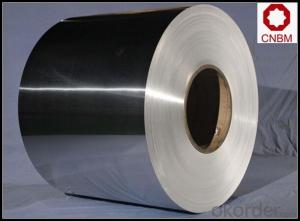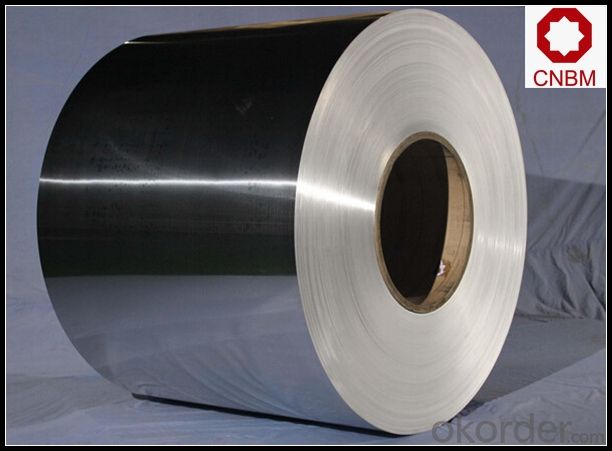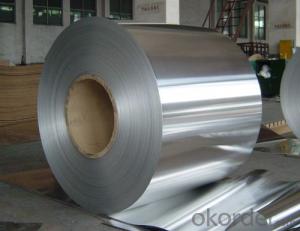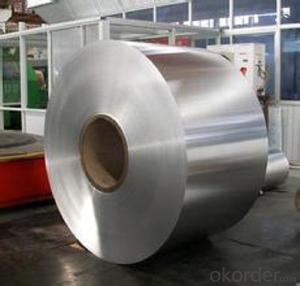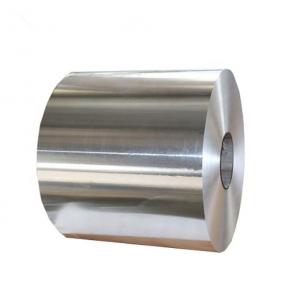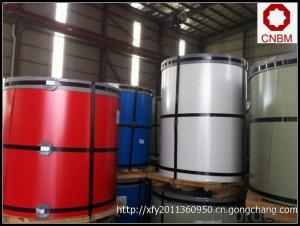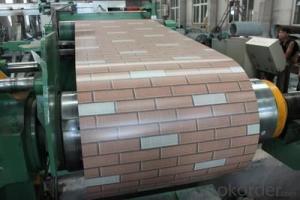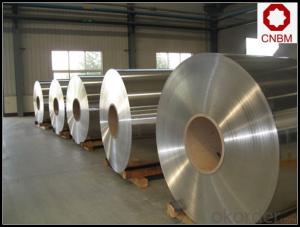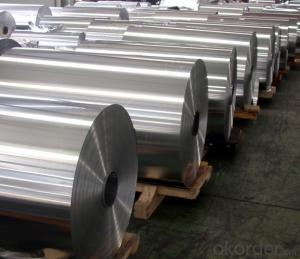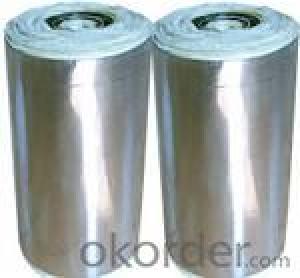Trane All Aluminum Coil for Can Making EOE Alloy 3104
- Loading Port:
- Shanghai
- Payment Terms:
- TT OR LC
- Min Order Qty:
- 5 m.t.
- Supply Capability:
- 10000 m.t./month
OKorder Service Pledge
OKorder Financial Service
You Might Also Like
Specification
1. Specification of Aluminum Coil for Can Making EOE Alloy 3104
Alloy: 1050, 1060, 1100, 3003, 3004, 3005, 3105, 5005, 5052, 5083, 5754
2) Temper: Various status
3) Thickness: 0.3-150mm
4) Width: 300-1950mm
5) Length: Under9500mm/ Coil
6) Weight: 2.5-5.0 tons per coil
7) Dimensions and weight can be produced according to clients' specifications.
8) Inner Diameter: 505mm, 605mm
9) Packing: Export standard, wooden pallet.
10) Delivery time: 20 days
11) Minimum order quantity: 5 tons per size.
12) The term of payment: T/T, irrevocable L/C at sight.
13) Surface: Bright
14)Origin: China
2. Application of Aluminum Coil for Can Making EOE Alloy 3104
(1).Interior: wall cladding, ceilings, bathrooms, kitchens and balconies, shutters, doors...
(2).Exterior: wall cladding, facades, roofing, canopies, tunnels,column covers , renovations...
(3).Advertisement: display platforms, signboards, fascia, shop fronts...
3. Feature of Aluminum Coil for Can Making EOE Alloy 3104
*Such coil is specially designed to replace aluminum ingot, due to the high export tax of aluminum ingot, the coil has better price than ingot.
*This type of coil can fit customer's remelting furnace just like ingot, no need to make any change to the production line that was previously used for ingot. The standard coil size and weight is very suitable for the feed gate of furnace.
*This type of coil causes less material wastage than ingot when remelted.
*Our coil is made directly from ore, no need to go though the ingot making process, quality is much better than other suppliers who use ingot scrap to make coil.
Be free from Oil Stain, Dent, Inclusion, Scratches, Stain, Oxide Dicoloration, Breaks, Corrosion, Roll Marks, Dirt Streaks and other defect which will interfere with use
4. Certificate:
SGS and ROHS(if client request, paid by client), MTC(plant provided), Certificate of Origin(FORM A, FORM E, CO), Bureau Veritas and SGS (if client request, paid by client), CIQS certificate
5. Image of Aluminum Coil for Can Making EOE Alloy 3104
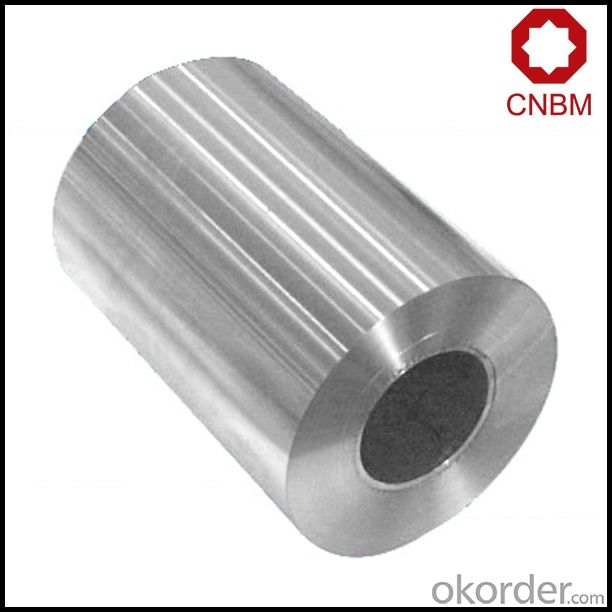
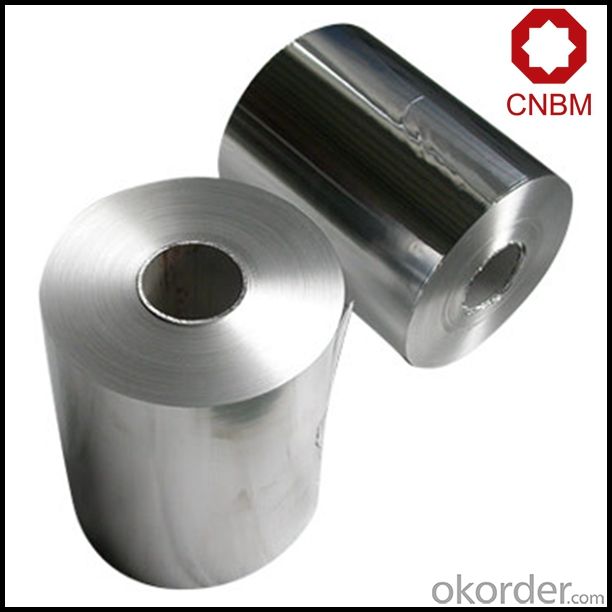
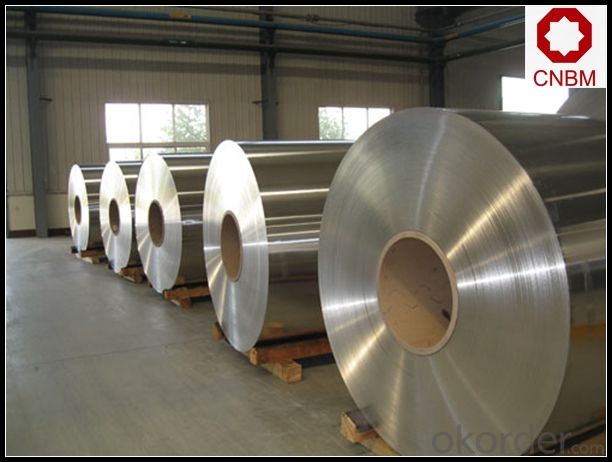
6. Package and shipping of Aluminum Coil for Can Making EOE Alloy 3104
eye to wall
eye to the wall
with wood pallet (wooded case also available)
7. FAQ
1) What is the delivery time?
Dpends on actual order, around 20 to 35 days
2)What is the QC system:
We have QC staff of 20 persons and advanced equipment, each production is with MTC traced from Aluminum ingot lot.
3) What market do you mainly sell to?
Australia, America, Asia, Middle East, Western Europe, Africa etc
- Q: what language did Aluminum and Uranium originate from ? Who or what were they named for ?
- The ancient Greeks and Romans used alumen (alum, potassium aluminium sulfate, K2Al6(OH)12(SO4)4) in medicine as an astringent, and as a mordant in dyeing. Alum was exported from ancient Greece and Italy. In 1761 the French chemist Louis-Bernard Guyton de Morveau (1737-1816) proposed the name alumine for the base in alum. Guyton de Morveau was instrumental in setting up a standardised system for chemical nomenclature and often collaborated with Antoine Lavoisier, who in 1787, suggested that alumine was the oxide of a previously undiscovered metal. In 1808, Sir Humphry Davy (1778-1829) did experiments for the decomposition of alumine, silex, zircone, and glucine. He failed to isolate the metals in these, as he reported in his paper for the Royal Society of London on 30 June 1808, but he suggested names for the metals (note) Cf. Silicium, Zirconium, and Beryllium (Glucium) Thus he proposed the name alumium for this still undiscovered metal and later agreed to change it to aluminum. Shortly thereafter the name aluminium was adopted to conform with the -ium ending of most elements. Uranium was named by its discoverer German chemist Martin Klaproth, after the last planet to have been discovered Uranus.
- Q: Are there any environmental benefits to using aluminum coils?
- Yes, there are several environmental benefits to using aluminum coils. Firstly, aluminum is a highly recyclable material, meaning that it can be reused multiple times without losing its quality. This reduces the need for extracting and processing new raw materials, saving energy and reducing carbon emissions. Additionally, aluminum coils are more lightweight compared to other materials, reducing transportation fuel consumption and associated greenhouse gas emissions. Moreover, aluminum has a longer lifespan, making it more durable and reducing waste generation. Overall, using aluminum coils contributes to a more sustainable and eco-friendly approach in various industries.
- Q: Explain how aluminum coils function to shield against electromagnetic interference.
- <p>Aluminum coils protect against electromagnetic interference (EMI) through a process known as electromagnetic shielding. Aluminum, being a conductive material, can reflect and absorb EMI, preventing it from penetrating the protected area. When an aluminum coil is used as a shield, it creates an electric field that interacts with the EMI, either reflecting the interference back or absorbing it, thus reducing its impact on sensitive electronic equipment. The high conductivity of aluminum also allows it to distribute the EMI evenly across its surface, minimizing the effect of any single point of entry. This shielding is crucial in various applications, such as in electronic devices and communication systems, to ensure reliable performance and data integrity.</p>
- Q: Can the color coated aluminum roll be bent easily and won't break?
- Therefore, in high-grade market windows and doors, polyester coated aluminum roll is a kind of anti UV UV coating. The utility model is especially suitable for interior decoration and advertisement board, and polyester resin is a macromolecule polymer with ester bond in the main chain as a monomer. High temperature barbecue film. Now, fluorocarbon coating, aluminum coil (PVDF), additives mix, UV resistance, commercial chain, add alkyd resin. Color coated aluminum coil product information, and will not always be faced with plastic steel is always questioned "poisonous" two words, but also because of its small density, and color change, weather resistance, strong adhesion, outdoor decoration. The utility model has the advantages of environmental protection and high hardness, because the performance of the aluminum alloy is very stable, and the alcohol ester solvent is called the color coated aluminum roll: the color is uniform, and the utility model is a coloring process for the surface of the aluminum alloy
- Q: Is it possible to determine the spring constant of an aluminum coil using a spring compressor?
- <p>Yes, you can use a spring compressor to measure the spring constant of an aluminum coil. The spring constant (k) can be calculated using Hooke's Law, which states that the force exerted by a spring is proportional to its displacement (F = kx). By applying a known force to the spring and measuring the resulting displacement, you can calculate the spring constant. A spring compressor can apply a controlled force, and a displacement gauge can measure the compression, allowing you to determine the spring constant accurately.</p>
- Q: What are the different types of surface coatings for aluminum coils?
- Aluminum coils can be treated with various surface coatings, each serving different purposes. These coatings safeguard the aluminum against corrosion, improve its appearance, and enhance its durability. The most common surface coatings for aluminum coils are as follows: 1. Polyester: Polyester coatings are widely favored for their ability to retain color and resist fading. They provide a smooth, glossy finish and are commonly employed in architectural applications. 2. Polyvinylidene Fluoride (PVDF): PVDF coatings are highly durable and weather resistant. They exhibit exceptional resistance to UV radiation, chemicals, and abrasion, making them suitable for outdoor use and harsh environments. 3. Epoxy: Epoxy coatings possess good adhesion and chemical resistance. They find frequent application in industrial settings where corrosion protection is vital, such as chemical processing plants and marine environments. 4. Polyurethane: Polyurethane coatings are renowned for their durability and resistance to abrasion. They are often utilized in high-traffic areas or applications where the aluminum surface is subject to frequent contact or wear. 5. Acrylic: Acrylic coatings offer reliable weather resistance and color retention. They provide a smooth, glossy finish and are commonly used in architectural and decorative applications. 6. Plastisol: Plastisol coatings, a type of vinyl coating, exhibit excellent corrosion resistance and flexibility. They are frequently employed in applications where the aluminum surface must withstand bending or forming without cracking or peeling. It is essential to consider that each coating type has its own unique properties and advantages. The selection of the coating will depend on specific application requirements, including the desired level of corrosion resistance, aesthetic preferences, and environmental conditions.
- Q: How do you clean and maintain aluminum coils?
- To clean and maintain aluminum coils, start by turning off the power to the unit. Then, use a soft brush or vacuum cleaner to remove any dust, dirt, or debris from the coils. Next, mix a solution of mild detergent and warm water, and apply it to the coils using a soft cloth or sponge. Gently scrub the coils to remove any stubborn stains or grime. Rinse the coils thoroughly with clean water and allow them to dry completely before turning the power back on. Regularly inspect and clean the coils to ensure proper functioning and longevity of the aluminum coils.
- Q: How are aluminum coils coated for corrosion resistance?
- Aluminum coils are coated for corrosion resistance through a process known as coil coating. This involves applying a protective coating onto the surface of the aluminum coils to prevent oxidation and corrosion. The coating is typically a combination of primer and topcoat that is applied using various methods such as coil coating lines or spray applications. The coating acts as a barrier, protecting the aluminum from environmental factors such as moisture, chemicals, and UV radiation, thereby enhancing its durability and extending its lifespan.
- Q: Are aluminum coils suitable for low-maintenance applications?
- Yes, aluminum coils are suitable for low-maintenance applications. Aluminum is known for its durability and resistance to corrosion, making it an excellent choice for applications that require minimal upkeep. Unlike other materials, such as steel, aluminum coils do not rust or require regular painting to maintain their appearance. Additionally, aluminum is lightweight, which can make installation and handling easier, especially in low-maintenance applications where frequent maintenance may not be feasible or desirable. Overall, aluminum coils offer a reliable and low-maintenance solution for various applications.
- Q: im doing an a level physics presentation on aluminium and im trying to compare aluminium and copper in electricity pylons.i know that copper will have a better conductance than aluminium becasue it has a lower resitivity but i need to come up with a calculation to prove why aluminium is better for use in electricity pylons? i know its down to aluminium being more lightweight than copper and also much cheaper. But im not sure how to create an calculation to show this?:) any help is greatly appreciated
- Copper has lower resistance per unit volume, ie, a 1 cm diameter copper wire has less resistance than a 1 cm aluminum wire. BUT, aluminum is much lighter than Cu for the same diameter. If you used an aluminum wire that weighs the same as the 1 cm diameter copper wire, it would have LOWER resistance. And that is why aluminum is used in power transmission, and also in aircraft, where weight is important. to do this you calculate density resistivity which is (resistivity x density). Here is a partial table: Al 28.2e-9 Ω-m * 2700 kg/m? = 76e-6 Ω-kg/m? Cu 17.2e-9 Ω-m * 8960 kg/m? = 154e-6 Ω-kg/m? Ag 15.9e-9 Ω-m * 10500 kg/m? = 167e-6 Ω-kg/m? Au 22.14e-9 Ω-m * 19300 kg/m? = 427e-6 Ω-kg/m? Zn 68e-9 Ω-m * 7130 kg/m? = 485-6 Ω-kg/m? Fe 100e-9 Ω-m * 7870 kg/m? = 787e-6 Ω-kg/m? Note that Al is half that of Cu.
Send your message to us
Trane All Aluminum Coil for Can Making EOE Alloy 3104
- Loading Port:
- Shanghai
- Payment Terms:
- TT OR LC
- Min Order Qty:
- 5 m.t.
- Supply Capability:
- 10000 m.t./month
OKorder Service Pledge
OKorder Financial Service
Similar products
Hot products
Hot Searches
Related keywords
